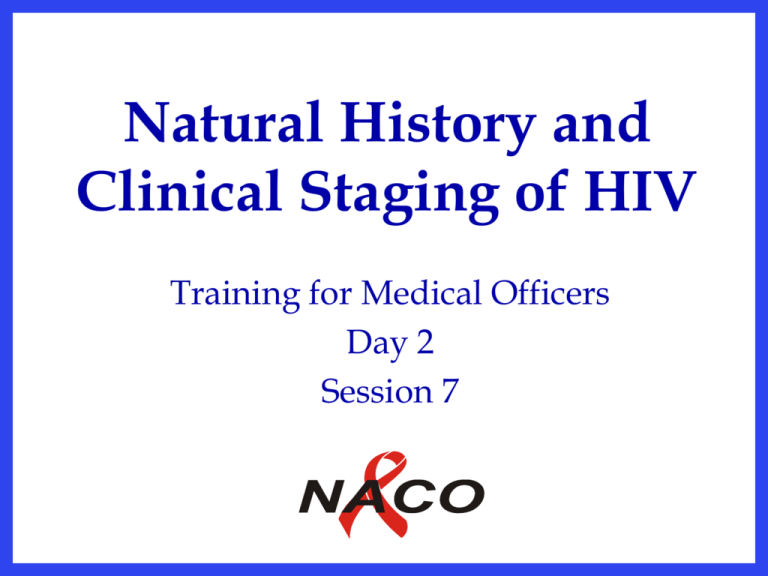
Natural History and
Clinical Staging of HIV
Training for Medical Officers
Day 2
Session 7
Session Objectives
• List the modes of HIV transmission
• Discuss the pathogenesis and life cycle of
HIV
• Describe the progression of HIV
• Classify an HIV-infected patient according
to the WHO clinical stages
Natural History of HIV
and Staging of HIV
2
Modes of HIV Transmission
Sharing Semen and
Vaginal Fluids
Through Infected
Blood
Natural History of HIV
and Staging of HIV
Sharing Needles
& Syringes
During Pregnancy
or Birth
Needle Stick
Injury
Breast Feeding
© I-TECH, 2005
3
Risk of HIV Transmission with Single
Unprotected Exposure
(Risk per 10,000 exposures)
Natural History of HIV
and Staging of HIV
4
Source: HIV Web Study, 2006
How HIV Infects the Body
HIV makes contact with cells located within the
genital mucosa
Virus is carried to regional lymph nodes
(1-2 Days)
Exponential viral
replication
Widespread systemic
dissemination to the brain,
spleen, distant lymph
nodes, etc. (5-11 Days)
Natural History of HIV
and Staging of HIV
5
Source: GHTM Fellowship Programme, 2006
Path of the Virus
HIV exposure at
mucosal surface
(sex)
Day 0
Virus collected by
dendritic cells,
carried
to lymph node
Day 0-2
HIV replicates in
CD4 cells, released
into blood
Day 4-11
Virus spreads to
other organs
Day 11+
Natural History of HIV
and Staging of HIV
© 1998 Massachusetts Medical Society. All Rights Reserved
6
HIV Lifecycle
©I-TECH, 2005
Natural History of HIV
and Staging of HIV
7
Life Cycle of HIV
Natural History of HIV
and Staging of HIV
8
Stages of HIV Infection
Viral transmission (2-3 wks)
Acute retroviral syndrome (2-3 wks)
Seroconversion (2-4 wks)
Asymptomatic chronic HIV infection (Avg. 8yrs)
Symptomatic HIV infection/AIDS (Avg. 1.3 yrs)
Natural History of HIV
and Staging of HIV
9
CD4 Count & Viral Load Over
Time
Natural History of HIV
and Staging of HIV
10
Source: Fauci, et al, Immu. Mech HIV Inf, 1996
Progression of HIV
• Acute Seroconversion
• Asymptomatic HIV (Clinical latency)
• Symptomatic HIV
• Acquired Immune Deficiency Syndrome
(AIDS)
Natural History of HIV
and Staging of HIV
11
Patterns of HIV Progression
• Typical progressors
• Rapid progressors
• Slow progressors
• Long-term non-progressors
Natural History of HIV
and Staging of HIV
12
WHO Clinical Staging
11 Case Studies
Natural History of HIV
and Staging of HIV
13
Case Study 1
© I-TECH, 2005
Natural History of HIV
and Staging of HIV
14
Case Study 2
© I-TECH, 2005
Natural History of HIV
and Staging of HIV
15
Case Study 3
© I-TECH, 2005
Natural History of HIV
and Staging of HIV
16
Case Study 4
© I-TECH, 2005
Natural History of HIV
and Staging of HIV
17
Case Study 5
© I-TECH, 2005
Natural History of HIV
and Staging of HIV
18
Case Study 6
© I-TECH, 2005
Natural History of HIV
and Staging of HIV
19
Case Study 7
Indian Ink Staining of
Cryptococcus in CSF
© I-TECH, 2005
Natural History of HIV
and Staging of HIV
20
Case Study 8
Natural History of HIV
and Staging of HIV
© I-TECH, 2005
21
Case Study 9
Courtesy of : GHTM, Chennai, 2006
Natural History of HIV
and Staging of HIV
22
Case Study 10
• 37 year-old HIV-positive male
• Lost 9 kg in last 3 months (previously 75
kg)
• Reports having a fever for the past
month
• Goes to bed by late afternoon
• Treated for pulmonary TB 5 months ago
What is his WHO clinical stage?
Natural History of HIV
and Staging of HIV
23
Case 11
• 34 year-old HIV positive male
• Suffers from bacterial sinusitis and a
fungal infection on his toes
• Has no problem keeping up with his
usual activities and weight is stable
• Treated for herpes zoster 4 years ago
What is his WHO Clinical Stage?
Natural History of HIV
and Staging of HIV
24
Key Points
• The most common mode of HIV transmission in
India is sexual
• Understanding the natural history of HIV is
important in predicting progress of the disease
and determining when to begin ART
• Clinical staging allows clinicians to reliably
predict in patients:
– The risk for death and opportunistic infections
– The need for disease prevention and ART
Natural History of HIV
and Staging of HIV
25




